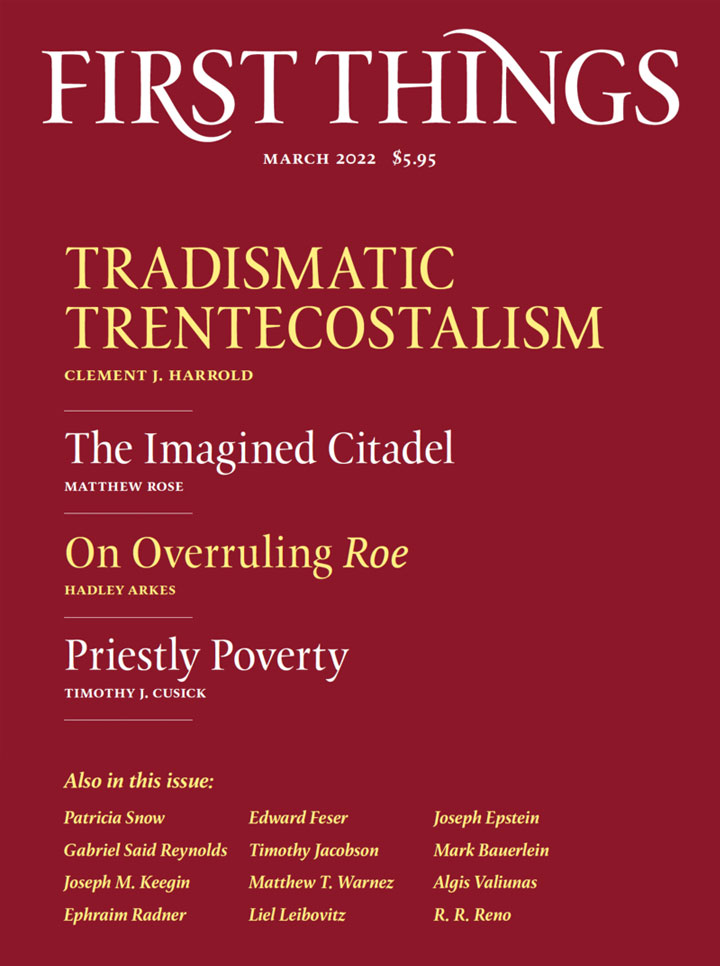The Church’s Lenten disciplines have often been seen in terms of bodily divestment: giving up food, giving up passions, giving away money. Such attention is rightly meant to turn us to God. But we should beware of giving up, in the process, the table, around which our bodily life and needs find their transfigured purpose. The table is central to the gifts God gives.
“Yea, mine own familiar friend, in whom I trusted, which did eat of my bread, hath lifted up [his] heel against me.” This verse from Psalm 41 has long been linked with Judas. At the Last Supper, Jesus announces that “he that dippeth his hand with me in the dish, the same shall betray me” (Matt. 26:23). Judas wonders aloud, “Is it I?,” and we all know the answer, etched in the very prophecy of David the Psalmist. The ones with whom we share our meals are sometimes our downfall. But we are so vulnerable because the ones with whom we share our meals are, more basically, precious vessels of a redeeming grace. What brings the most good, just because of its power, can also do what is most awful.
A few years ago, my wife and I began trying to keep the Sabbath, by which I mean the Scriptural Seventh Day, ushering it in with the Friday evening meal. The reasons we chose to do this are complicated (and a bit obscure, even to us). Although we are Christians, we simply follow my father’s childhood Hebrew-English siddur (order of service). The movement of the Shabbat meal’s prayers is clear and unswervingly steady from week to week: light and hence creation, the life of the family, wine, water, bread, and finally singing. Each element is lifted up and offered with the blessing of God. In this procession from light to bread, traveling from creation through Exodus as a people, and ending in song, the siddur invites those seated around the table to gaze upon and celebrate the deep substance of God—the literal weight of his kabod, or “glory.” I can attest to this.
We need to contemplate Judas’s treachery from this vantage. Because Judas is Jesus’s “bread-sharer” or “companion,” his betrayal is not at the shared table, but of the shared table, and thus it is an attack on the deepest order of divine giving—an assault upon the universe’s very constitution. In the Passion account, Judas’s betrayal of the common meal hangs like a gleaming sword brought down with shuddering horror into the midst of normal human hope, a hope sustained only insofar as our fellowship with others endures and redeems our trust.
“It was not an enemy that reproached me,” it was “mine own familiar friend . . . which did eat of my bread” (Ps. 55:12–13; 41:9). In our daily life, we all know that such treachery can lurk within the shadows of our homes, or sneak about the corners of our workplaces, or slide along the streets of our neighborhoods. It strikes with the same destructive power and brings the same sorrow, by analogy, as Judas did. “Well might the sun in darkness hide,” a verse from Isaac Watts tremblingly admits.
As the centuries have unfolded, we can see that one of the chief poisons unleashed by Judas, as it were, is the dissolving of table fellowship itself. The decline of the family meal—which is the basis for the communal meal of friends and strangers—is well documented in the modern West. Perhaps the Church has her share of responsibility in this. There has been some pushback of late, to be sure, and we occasionally see articles bemoaning the disappearance of the daily gathering of generations around the table. Most contemporary researchers on these matters, however, are interested in issues like mental health and obesity. It seems that eating together regularly makes us “happier” and helps us regulate our weight. Some scholars of the topic wondered a few months ago whether COVID restrictions—keeping us at home, off the streets and out of bars—would help revive the family meal. But it appears that the pandemic has made little difference: maybe a little more sitting around together, but also a lot more “snacking” and way more “screen time.”
The Church’s relationship to food and eating is historically ambivalent, wavering between reveling in the imagery of heavenly banquets and encouraging severe fasting here on earth, between hopes for festive abundance and worries over vanity. More philosophical reflection on common meals is equally mixed up, with Platonists, Stoics, and Epicureans taking diverse attitudes. In his 1825 chef d’oeuvre, The Physiology of Taste, the modern inventor of gustatory philosophy, Jean Anthelme Brillat-Savarin, provided a potpourri of wisdom and technique, from how to cook tuna omelettes to the influence eating asparagus can have upon dreams. His is among the most delightful of books, and its chaotic approach to food reflects its author’s own wonderfully confected life as lawyer, violinist, bon vivant, and political sage. The volume also reflects a moment when meals were already becoming a decentered distraction. Eating obviously “happens,” but its meaning seems ambiguous.
Even Brillat-Savarin, at his most pungent, understood that food, when translated to “the table” and its gathering, marks a peculiar and “theological” reality. “The table”—as contrasted with simple eating in its universal animalistic impulse—is the site of the gift of human love and joyful thanksgiving. The table originates from and is rooted in God’s creative grace and providence.
Some of Brillat-Savarin’s famous bons mots point to this: “He who receives friends and pays no attention to the repast prepared for them is not fit to have friends.” “To invite a person to your house is to take charge of his happiness as long as he be beneath your roof.” But most especially apt is Brillat-Savarin’s commendation of “gastronomy” itself, the morally serious attention to which a table meal is rightly subjected. Food properly prepared is “that which sustains us, from the cradle to the grave, which increases the gratifications of love and the confidence of friendship, which disarms hatred and offers us, in the short passage of our lives, the only pleasure which, not being followed by fatigue, makes us weary of all others.” Judas, we could say, when he turns the table into a place of betrayal, indicates by negation where the shared meal belongs: within the folds of family and friendship, the daily form for blessing God and receiving his blessings.
Jesus doesn’t talk much about the things we tend to fuss over when it comes to food. He certainly does not seem interested in the remarkable amount of time and money we now increasingly expend on food, nor our elaborate preparations and sometimes exhaustive discussions of consumption. In marked contrast, he speaks of the spiritual power of fasting, and notes the moral lightness of things we eat and of what we wear (Matt. 6:25). Nonetheless, Jesus seems to take enormous joy in the circumstances of shared food: weddings, fatted calves, feasting, meals with the rich and the poor, with the good and the evil, teaching, salting and curing. He recognizes his own reputation in this regard: “The Son of Man came eating and drinking” (Matt. 11:19). Meals with others are for Jesus places of healing, joy, truth-telling, adoration, purpose, attentiveness, and openness to God. We can sense his delight in meals, a joy that far outstrips the mere utility of consuming food or having a convenient time to talk with others.
The exact relationship to Passover or other religious meals, like the Sabbath’s, to the Last Supper remains open-ended. But we can be certain that the shared meal in the Upper Room is focused upon a people, Israel, and upon her families, borne by God’s mercy and power, and now by his Son’s body. Every possible joy and responsibility, prayer and thanksgiving, that the People of God carry comes together here. One reason my wife and I began to celebrate the Sabbath meal, I imagine, is that we intuited the Church’s own fraying appraisal of God’s created gifts. We worried that the table had been rotated to the side, and felt a growing vacuum of attention and thanks in times of table fellowship, a loss that Christians increasingly share with their culture. In a confirmation class of teenagers I once taught, I asked the gathering what graces, if any, their families said at dinner. Only one of them, it turns out, had a regular family meal.
Lent is certainly a time for adopting penitential disciplines. But whatever they may be, they must lead us not away from but back to the table. We live in a paradoxical age. Diets, exercise, long workdays, and busy school schedules are today’s disciplines. But they are me-centered. Perhaps our discipline ought to be to break bread with others in ways that anticipate the excesses of God’s abundant grace.
The Testament of Ann Lee Shakes with Conviction
The Shaker name looms large in America’s material history. The Metropolitan Museum of Art hosts an entire…
Dilbert’s Wager
Niall Ferguson recently discussed his conversion to Christianity. He expressed hope for a Christian revival, which he…
The Real Significance of Moltbook
Elon Musk thinks we may be watching the beginning of the singularity. OpenAI and Tesla AI designer…



